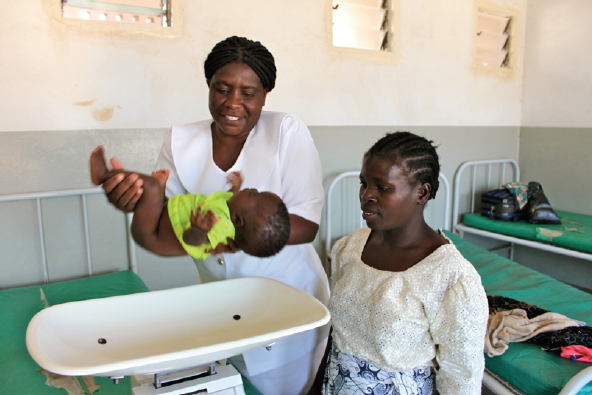In rural communities of the African country of Malawi, the Chichewa language words for pregnancy - "pakati" and "matenda" - translate to "between life and death" and "illness." These negative terms are not surprising in a country where the lifetime risk of death for a mother is about one in 40, and one in every 40 newborns doesn't make it past the first month of life.
But a report published this week in International Health shows that the chances of newborn survival in Malawi have improved. The report describes how simply putting mothers and nurses in charge of decision-making around childbirth helped to reduce newborn deaths in this poor country in central Africa.

Ellen Biyasoni takes her four-week-old son for a check-up at the clinic.
Take the case of Ellen Biyasoni, who was pregnant for the third time. In her first two pregnancies, she'd started her labor at home in her village with a traditional birth attendant. Then, when complications developed, she had to be taken by bicycle to the nearest health center. But that facility couldn't handle emergency obstetric cases and had to transfer her to the district hospital 50 kilometers away. In the first two pregnancies, Ellen was lucky; even with the delays, she got a Caesarean section just in time, and both she and her infants survived. The third time around, she was a time bomb waiting to go off - at risk of rupturing her uterus if she had a long labor. But this time, she'd been part of a women's group that was supporting women like Ellen to get to the hospital a couple a weeks before her due date. The group had also gathered funds to buy a bicycle ambulance to take pregnant mothers to the clinic and transfer them from there to the hospital. At the hospital, the staff were now monitoring and managing mothers like Ellen more safely. They also worked out how to keep enough blood on hand in case Ellen needed it during surgery. Ellen gave birth to a healthy boy, Cliff, delivered without incident with another Caesarean section.
Through the changes that Ellen benefitted from, the report estimates that, in just over two years, newborn deaths decreased by over 20 percent and about 1,000 newborn lives were saved. The researchers took an unconventional approach to achieve this result. Most efforts to improve outcomes in poor countries focus on making sure that there are enough resources - clinics, doctors, nurses, drugs - to deliver safe care. Others focus on training - making sure the nurses and doctors know how to deliver safe care. This program did neither. Instead, it built on resources and knowledge that already existed in Malawi. The idea was simple: ask mothers and nurses to identify what was stopping them from receiving or providing safe care, and then get them to make sure their solutions actually worked.
The lead partner in the study - the Institute for Healthcare Improvement (IHI) - has pioneered ways to put frontline nurses and doctors in charge of making decisions, guided by data they collect on their own performance. This approach was used in the clinics in Malawi. Meanwhile, in the surrounding villages women were gathered into groups to talk about the risks of pregnancy and childbirth - and not all the conversations were just about health. Some wanted to focus on improving nutrition by starting market gardens, others started fundraising for a bicycle ambulance so that mothers could get to hospital quickly when they went into labor.
To see which approach - community or clinic - was more effective, a team of trackers went door to door a couple of years later to find out whether mothers and newborns had survived. The main finding of the study was that there were fewer newborn deaths in those communities that had both women's groups and activated health clinics. No additional lives were saved if the efforts were directed only at the women's groups or the clinics; the improvement efforts had to be directed at both simultaneously.
While the program was successful in reducing neonatal deaths, some questions remain about why only newborns' - and not mothers' - lives were saved by these efforts, and how easy this program will be to replicate. The report shows that it takes time to roll out interventions like this and, to be effective, clinic and community interventions need to be delivered at a high intensity. The concentration of women's groups in these communities may not have been high enough to be fully effective. The women's group idea has been tried in other poor countries in Asia and Africa - mostly with positive results (Lancet. 2013 May 18;381(9879):1736-46). Based on that analysis, the concentration of women's groups may not have been high enough in Malawi to save both mothers and infants.
The chances are good that this effort can be spread and sustained in Malawi. The all-Malawian NGO - MaiKhanda - that implemented the study remains a durable resource for the Malawian health system. MaiKhanda is training other organizations and Malawian health services to use these approaches on a broader scale. The approach was shown to be cost effective: lives were saved without an expensive infusion of supplies and materials. In other words, lives can be saved just by asking nurses and mothers to systematically apply their best ideas, using the resources they have already, to improve care around the time of birth.
There is also strong support from Malawi's leaders: the Malawian president, Joyce Banda, is at the forefront of the efforts to save mothers and newborns. As part of her Maternal Health and Safe Motherhood Initiative, the government is building shelters on hospital grounds for mothers like Ellen who need to come in from the rural areas to receive hospital care.